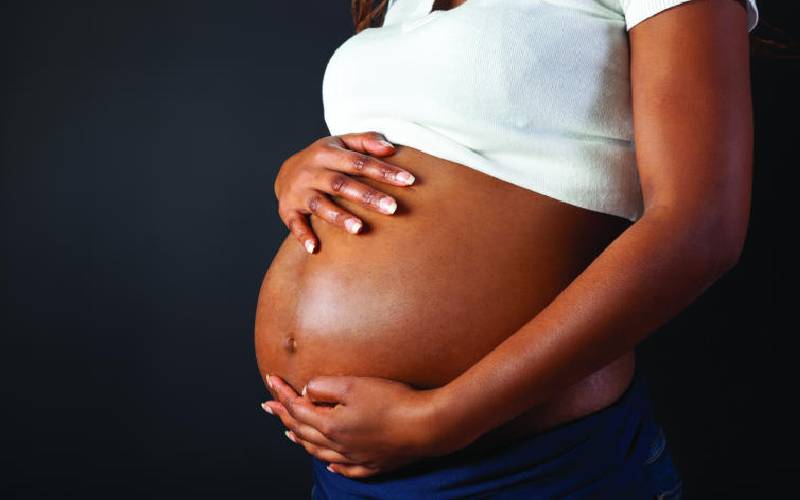
When Pauline Aketch* had her first baby, she could not believe all the love one could feel for another human.
She had been married two years before she and her husband welcomed their first baby.
According to Aketch, there was no bond more special than one between a mother and her child.
She says her husband too acknowledged that even though he is emotionally attached to his son, it is not the same as what he sees between mother and baby.
But while everyone around them was excited about the new addition to their family, Aketch had unanswered questions.
She says though they are in speaking terms, she is not very close with her mother.
"We can talk on the phone once in a while. She helped me during my pregnancy, but that's just about it."
Growing up, they were never very close.
Reading people's messages to their mothers talking about how they will always need them even when they are older and have their own children, she did not understand.
"I have never told my mother I love her. She has never said it to me. I have never heard her say it to any of my siblings either."
Before Aketch had her baby her friends organised a baby shower for her.
The baby shower is a ceremony held for expectant mothers to tell them what to expect in the new motherhood journey.
While some are purely meant to be fun, some are informative.
In some cases, a professional doctor, midwife, gynaecologist or paeditrician are invited to talk about motherhood expectations, challenges and how to deal with them.
Aketch heard many things from many people. It was also the first time she heard about postpartum depression.
While the professional talked about it, the symptoms and characteristics reminded her of someone all too familiar - her mother.
Being the firstborn out of three children, she was on the receiving end of all that her mother spewed.
When she was not the victim, she was a witness.
"My mother is very emotional. When she's angry she'll say the most hurtful things, and like many African parents, she is not a fan of apologising," Aketch says chuckling.
She adds that she has accepted her mother, like everyone else, did not choose to have PPD. Aketch fears she may get it too, even if not with the first baby.
Symptoms of postpartum depression include difficulty sleeping, appetite changes, excessive fatigue, decreased libido, and frequent mood changes.
These are also accompanied by other symptoms of major depression, which are not normal after childbirth, and may include depressed mood; loss of pleasure; feelings of worthlessness, hopelessness, and helplessness; thoughts of death or suicide or thoughts or hurting someone else.
What if she had it too? What if she didn't like her child?
Although there is no direct link on mothers who have PPD passing it on to their children, a strained relationship with the child and other adversity are predictive of PPD.
The Journal of Affective disorders, in an article published on June 19 last year, highlighted the importance of examining the interaction between genetic, hormonal and environmental factors to fully understand the risk factors for PPD.
According to Prof Lynne Murray of the University of Reading's Department of Psychology, studies of healthy mother–infant relationships show infants are highly sensitive to their interpersonal environment.
It is, therefore, likely that postpartum depression, by virtue of its impact on maternal interpersonal functioning, will disrupt normal infant engagements with the mother and, as a consequence, impair infant developmental progress.
Although postpartum depression is common and well-studied in mothers, many fathers also experience symptoms.
Aketch says she is not sure if her mother understands that she may have been experiencing PPD. They have never talked about it.
An article on the International Review of Psychiatry published in July 2009 states that the strongest predictors of postpartum depression were past history of psychological disturbance during pregnancy, poor marital relationship and low social support, and stressful life events.
Aketch's concern that her mother's PPd may have affected her and her siblings were not completely unfounded.
According to the Issues in Mental Health Nursing journal, postpartum depression is a family affair.
It says the effects of postpartum depression on mothers, fathers, and children point to a re-conceptualization of PPD as a mental health condition that affects the whole family.
Questions have further been raised on the difference between PPD and depression that occurs in the postpartum period.
Focus, a site for psychiatry learning, says the difference is a point of debate.
The evidence for and against diagnostic distinction for PPD is reviewed with respect to epidemiology and treatment. Overall, evidence that PPD is distinct from major depressive disorder is mixed and is largely affected by how the postpartum period is defined.
For depression occurring in the early postpartum period, symptom severity and heritability suggest that PPD may be distinct.
Depression occurring in the later postpartum period may be more similar to major depressive disorder occurring outside of the perinatal period.
Focus adds that the clinical significance of this debate is considerable given that PPD, the most common complication of childbirth, is associated with immediate and enduring adverse effects on maternal and offspring morbidity and mortality.
As the world marks Mother's Day, many are disturbed by the memories of what their motherhood journey held, as others have little to say to mothers who put them through the effects of PPD.
Uncover the stories others won’t tell. Subscribe now for exclusive access
- Unlimited access to all premium content
- Uninterrupted ad-free browsing experience
- Mobile-optimized reading experience
- Weekly Newsletters
- MPesa, Airtel Money and Cards accepted
